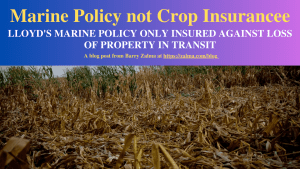Marine Policy not Crop Insurance

See the full video at https://rumble.com/v2jma1i-marine-policy-not-crop-insurance.html and at https://youtu.be/UbWs5-M95LI
After Hurricane Irma damaged its property, Pero Family Farm filed an insurance claim. Lloyd’s accepted coverage for part of the claim but denied coverage for the rest. Lloyd’s sued seeking declaratory judgment that the insurance policy did not cover the denied portion of the claim. The district court granted summary judgment to Lloyd’s.
In Certain Underwriters At Lloyd’s London Subscribing To Policy No. B0799MC029630K v. Pero Family Farm Food Co., Ltd., No. 20-12711, United States Court of Appeals, Eleventh Circuit (April 10, 2023) the Eleventh Circuit interpreted the policy.
FACTUAL BACKGROUND
Pero grows vegetables (primarily peppers and beans) that it prepares and packages for either retail sale at grocery stores or wholesale by food service companies. The seeds Pero uses are either prepared by Pero from its own vegetables or purchased from third-party seed providers. Pero plants some of its seeds in fields it owns or leases in Florida. But Pero also sends seeds to Trans Gro, a third-party plant grower. Trans Gro plants the seeds and grows the seedlings in its greenhouses in Immokalee, Florida, until the seedlings are mature enough to be transported to Pero’s fields and planted in the ground.
Once Pero harvests its vegetables, it transports them to its cooled storage facility in Delray Beach, Florida, where it cleans, sorts, stores, and packages the vegetables. Pero packages some of its vegetables in plastic packaging. It then transports the vegetables from the Delray Beach facility to its final customers.
The Policy
In its 2015 insurance application, Pero stated that its “primary operations” were “[g]rower, [p]acker, [s]eller of vegetables[,] mainly [p]eppers and [g]reen [b]eans”; that the “[t]ype of [g]oods to be [i]nsured” was “produce, primarily peppers [and] beans”; and that it sought to insure “[d]omestic shipments” of “[g]reen beans [and] peppers on vehicles (dump trucks) moving from field to packing house[;] seed is also stored on location.” The policy contained a Florida choice of law provision.
Subject-Matter Insured
All goods and/or merchandise of every description incidental to the business of the Assured or in connection therewith.
The policy limits were $150,000 for “[a]ny one domestic inland conveyance” and $5,000,000 for “[a]ny one location.”
Pero’s Insurance Claim
On September 10, 2017, Hurricane Irma struck South Florida. Pero submitted a claim to Lloyd’s for the damage it suffered as a result of the hurricane. Pero sought coverage for the loss of vegetables stored in the coolers at its packing house in Delray Beach, as well as: (1) seedlings that had been growing in Trans Gro’s greenhouses in Immokalee; (2) plants that had been growing in Pero’s fields; and (3) plastic coverings that had been placed over the plants growing in Pero’s fields.
Lloyd’s accepted coverage (and issued payment) for Pero’s loss of the vegetables in its coolers that were in transit but denied coverage for the damage to the seedlings growing in Trans Gro’s greenhouse, the plantings in Pero’s fields, and the plastic coverings on Pero’s fields that were not in transit.
The Lawsuit
Lloyd’s sued Pero seeking a declaration that the policy did not cover the damage to the seedlings, plantings, or plastic coverings. Lloyd’s alleged that coverage was not due under the policy because:
“[t]he seedlings, planted crops, and crop covers were not in transit at the time of the loss,” so “there [was] no ‘in transit’ coverage”;
“[t]he seedlings, planted crops, and crop covers were not in storage at any location as defined by the [policy],” so “there [was] no ‘location’ coverage”; and
“[s]eedlings and immature plants are crops and the [policy] d[id] not provide crop coverage”-because Pero “specifically sought cargo coverage for the transit and storage of fresh harvested produce, dry seeds[,] and packaging from field to storage and while in storage,” not “crop insurance.”
Summary Judgment for Lloyd’s
The district court granted summary judgment for Lloyd’s and denied Pero’s motion because “the unambiguous language in the [p]olicy d[id] not provide coverage for Pero’s damaged seedlings, plantings, and plastic coverings.”
DISCUSSION
The Eleventh Circuit agreed with Pero that the policy’s language was clear and unambiguous. But it also agreed with Lloyd’s and the district court that the policy did not cover Pero’s damaged seedlings, plantings, and plastic coverings.
The policy unambiguously covered goods or merchandise only while they were in transit or, by extension, “in store” as “stock” at a “location” during the transit process:
Within the geographical limits of this policy, cover hereunder shall attach from the time the Assured assumes an interest in and/or responsibility for the subject [-] matter insured and continues uninterrupted, including transit, stock[,] and location coverage until that interest and/or responsibility ceases.
The geographical limits of the policy were from a beginning point to an end location, and anywhere goods or merchandise stopped in between. Coverage “continue[d] uninterrupted, including transit, stock [,] and location coverage,” during that trek.
The policy was titled “Marine Cargo Insurance,” and “cargo,” although not defined in the policy, was generally understood, at the time, to mean “[g]oods transported by a vessel, airplane, or vehicle.”
Consistent with the “Duration of Voyage Clause,” the policy’s title, and the claims procedure, the policy’s other provisions showed that it covered goods or merchandise only while in transit or in storage during the transit process.
The policy’s “Information” section said that the policy covered “[t]ransits from field to packing house.” And the statement of value attached to the policy noted that Pero’s Delray Beach “packing house” held “[s]tock/[i]nventory” valued at $5,000,000-the same amount as the policy’s per “location” coverage limit.
Pero’s 2015 insurance application which was attached to and made a part of the effective policy, which the Eleventh Circuit must treat as part of the contract, explained that the policy covered only goods or merchandise in transit or in storage during the transit process. Specifically, the application documents showed that Pero sought to insure “[d]omestic shipments” of “[g]reen beans [and] peppers on vehicles (dump trucks) moving from field to packing house” and the “seed . . . stored on location.”
Because the insurance policy clearly and unambiguously did not cover the portion of Pero’s claim that Lloyd’s denied, the district court properly granted summary judgment for Lloyd’s and denied partial summary judgment for Pero.
Insurance policies are contracts and must be interpreted as written if unambiguous. The policy obtained by Pero was not insurance of its crop but was limited to coverage for that portion of its crop while it was in transit. The hurricane caused damage to some of the crop and merchandise in transit but did not insure other damages caused by the hurricane to property not in transit. Lloyd’s used simple, clear, unambiguous language that both parties agreed was unambiguous and the Eleventh Circuit applied the insurance contract as written.
 (c) 2023 Barry Zalma & ClaimSchool, Inc.
(c) 2023 Barry Zalma & ClaimSchool, Inc.
Subscribe and receive videos limited to subscribers of Excellence in Claims Handling at locals.com https://zalmaoninsurance.locals.com/subscribe.
Consider subscribing to my publications at substack at https://barryzalma.substack.com/publish/post/107007808
Barry Zalma, Esq., CFE, now limits his practice to service as an insurance consultant specializing in insurance coverage, insurance claims handling, insurance bad faith and insurance fraud almost equally for insurers and policyholders. He practiced law in California for more than 44 years as an insurance coverage and claims handling lawyer and more than 54 years in the insurance business. He is available at http://www.zalma.com and zalma@zalma.com
Follow me on LinkedIn: www.linkedin.com/comm/mynetwork/discovery-see-all?usecase=PEOPLE_FOLLOWS&followMember=barry-zalma-esq-cfe-a6b5257
Write to Mr. Zalma at zalma@zalma.com; http://www.zalma.com; http://zalma.com/blog; daily articles are published at https://zalma.substack.com. Go to the podcast Zalma On Insurance at https://podcasters.spotify.com/pod/show/barry-zalma; Follow Mr. Zalma on Twitter at https://twitter.com/bzalma; Go to Barry Zalma videos at Rumble.com at https://rumble.com/c/c-262921; Go to Barry Zalma on YouTube- https://www.youtube.com/channel/UCysiZklEtxZsSF9DfC0Expg; https://creators.newsbreak.com/home/content/post; Go to the Insurance Claims Library – https://zalma.com/blog/insurance-claims-library.
Like this:
Loading…
Related



